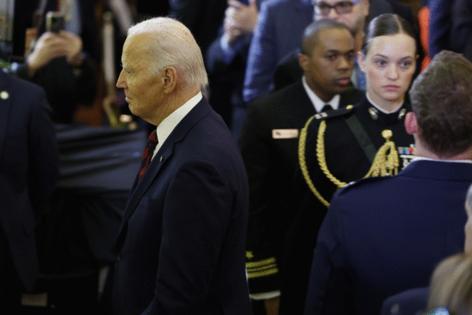Biden has more vets to pardon before leaving
Published in Political News
In mid-December, on the same day that he granted clemency to 1,500 Americans, President Joe Biden issued pardons to 15 of the nation’s military veterans. These pardon recipients were mainly former officers and non-commissioned officers, aged 46 to 79, with honorable discharges and military decorations. Before or after leaving the armed forces, they had committed non-violent offenses, often at a young age.
Biden’s action, although welcome, fell far short of doing what justice demands for our men and women in uniform. Before he leaves office on Jan. 20, the president should wipe the slate clean for the 300,000 other former soldiers who deserve a second chance. This much larger ex-military cohort served at home and abroad after 9/11 but received less than honorable discharges because of performance problems or rules infractions while in uniform.
As a result, depending on their exact discharge status, these veterans are not eligible either for educational benefits under the GI Bill or for disability payments and healthcare treatment from the Department of Veterans Affairs (VA) for their service-related injuries and illnesses. These former soldiers also don’t get the same preferential treatment in hiring given to other veterans.
Being drummed out of the military in this fashion, without even a court-martial, has lasting consequences. As civilians, former soldiers with “bad paper” aren’t eligible for preferential treatment when applying for public sector jobs. The American Legion, Veterans of Foreign Wars, and Disabled American Veterans won’t even allow them to join. And individual veterans who seek to change their discharge status face a long, frustrating legal fight.
According to Swords to Plowshares, a San Francisco-based advocacy group, veterans who leave the military with less than honorable discharges are 1.6 times more likely to have untreated mental health issues and twice as likely to commit suicide. That’s why Swords, Minority Veterans of America and Black Veterans Project are urging Biden to issue a blanket pardon for men and women living with the stigma of “bad paper,” so they can get help needed to succeed in civilian life.
These advocates cite a 2023 Syracuse University study which found that minorities and women were disproportionately represented among such veterans due to “racial inequities in the military’s criminal justice system” and the number of women suffering trauma from military sexual assaults.
As other reports have documented, their discharge decisions were often made in the absence of uniform disciplinary standards applied across military branches or even by individual commanders within the same branch. Their “bad paper” is not the result of court martials and, instead, reflects the DOD’s desire to save money and maintain “force readiness” by quickly shedding soldiers with service-related physical or mental health problems that would otherwise require costly treatment and rehabilitation.
Not surprisingly, a Government Accountability Office investigation found that, within two years of leaving the service, 62% of all service members separated from the military for misconduct between 2011 and 2015 were diagnosed with post-traumatic stress disorder (PTSD) and other mental health issues, traumatic brain injuries, or drug and alcohol dependence.
President-elect Donald Trump has announced plans to pardon his 1,500 supporters — including both veterans and active duty military personnel — who were charged with crimes when they stormed the Capitol in an attempt to overturn the 2020 election results. So it would be a grave injustice for Biden to overlook this opportunity to pardon veterans who served but committed no similar offenses before being denied an honorable discharge.
Biden, declaring that he was “righting an historic wrong,” did offer the possibility of discharge upgrades, last year, to some LGBTQ+ service members who were court-martialed and kicked out before the Pentagon’s “Don’t Ask, Don’t Tell” policy was repealed in 2011.
Now, the White House has an opportunity to make more history. As vet groups have reminded the president, only he can prevent past “administrative separations and resulting denial of critical veterans’ benefits” from becoming “a life sentence,” that has already left too many ex-soldiers at higher risk of substance abuse, joblessness, homelessness, incarceration and self-harm.
_____
Steve Early and Suzanne Gordon are the co-authors of “Our Veterans: Winners, Losers, Friends and Enemies on the New Terrain of Veterans Affairs” (Duke University Press). Gordon is also a co-founder of the Veterans Healthcare Policy Institute and two previous books on veterans’ issues. They can be reached at Lsupport@aol.com ) This column was produced for Progressive Perspectives, a project of The Progressive magazine, and distributed by Tribune News Service.
_____
©2025 Tribune Content Agency, LLC.




























































Comments